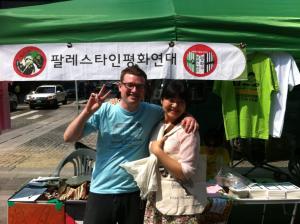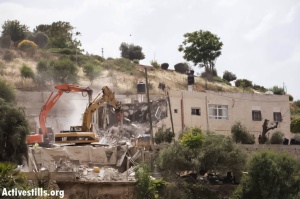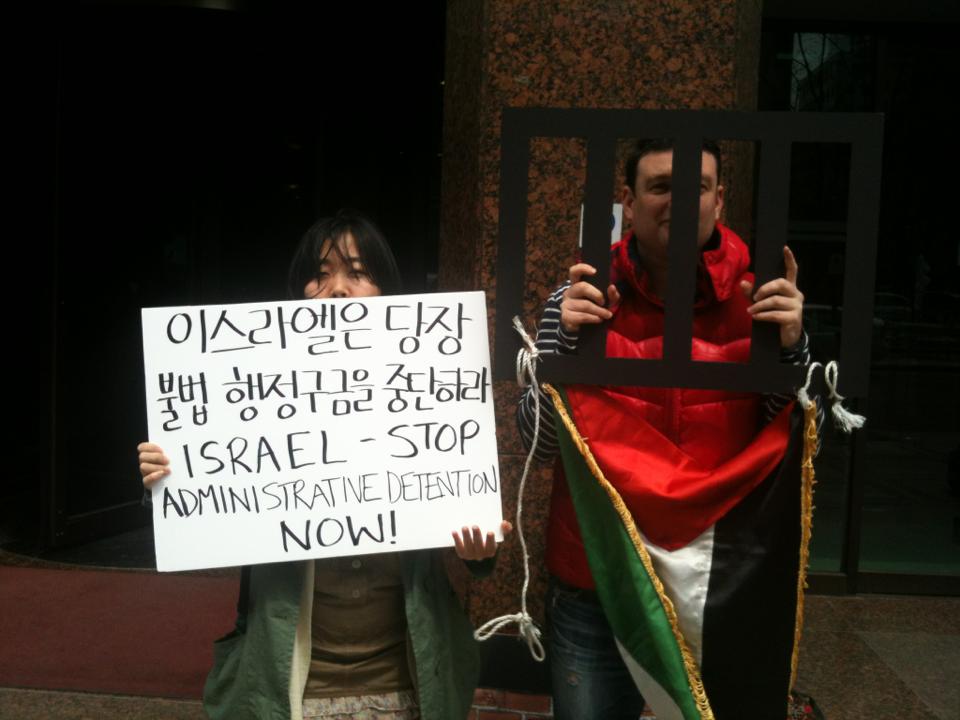We, Palestine Peace and Solidarity in South Korea strongly support for this call from BDS48. Our actions will be followed later this month with other human rights groups in South Korea.
Haifa, 7 February 2017
The Boycott, Divestment and Sanctions (BDS) Committee of Palestinian Citizens of Israel (BDS48) calls upon our Palestinian people in the homeland and the Diaspora, the peoples of the Arab world, and people of conscience worldwide to boycott and divest from Hyundai Heavy Industries (HHI), until it ends its involvement in Israel’s violations of our human rights, particularly in Jerusalem and the Naqab (Negev).
BDS48 is launching this boycott campaign at this particular moment in light of the extensive use of Hyundai equipment by the Israeli authorities in the recent demolitions of many homes of Palestinian citizens of Israel in the Bedouin village of Umm al-Hiran in the Naqab, on 18 January 2017, and in Qalansawa, further north, on 10 January 2017. According to Arabic media reports, the Israeli authorities are planning a second wave of home demolitions in Umm al-Hiran in the coming few days.
Despite being faced with documented evidence of its persistent complicity in Israeli ethnic cleansing policies against Palestinians and Syrians in the territories occupied since 1967, Hyundai has failed to stop its business-as-usual involvement. It has thus forfeited its responsibilities as stated in the UN Global Compact and the UN Guiding Principles on Business and Human Rights.
In Umm al-Hiran, Israeli armed forces destroyed many homes in the village, forcibly removing its Bedouin Palestinian population for the second time since the 1948 Nakba, injuring tens of peaceful protestors, and murdering the educator Yaquob Abu al-Qiyan in cold blood. The objective of this bloody conquest is to establish a Jewish-only colony on the ethnically cleansed village’s lands.
This latest crime by Israel’s regime of occupation, settler-colonialism and apartheid comes as part of its ongoing policy of gradual ethnic cleansing since 1948 and that has led to the forcible displacement of most of the indigenous Palestinian people from our ancestral land. Israel today has more than 60 racist laws that legalize and institutionalize its special form of apartheid against its indigenous Palestinian citizens.
Inspired by the massive global solidarity movement that helped to end apartheid in South Africa, and stemming from the moral responsibility that falls on the shoulders of citizens and institutions everywhere to end any involvement in human rights violations, we, as Palestinian human rights defenders in Israel, call on:
- People of conscience around the world to boycott Hyundai products;
- Institutions, investment funds and churches to divest from Hyundai and local councils to exclude the company from public tenders;
- Hyundai workers and the Korean Confederation of Trade Unions (KCTU) to stand in solidarity with our peaceful struggle by pressuring the Hyundai management to stop the company’s complicity in Israeli violations of human rights. Our campaign is not intended at all to harm the interests of the company’s workers but to protect the rights of our people as stipulated in international law.
The achievements and impact of the global, Palestinian-led BDS movement for Palestinian rights have grown immensely in recent years, to the extent that Israel has recognized the movement’s “strategic” impact. BDS is today an essential pillar of the nonviolent Palestinian popular struggle for our inalienable rights under international law, most importantly the right to self-determination and the right of our refugees to return to their homes of origin.
Through this campaign to boycott Hyundai and your effective participation in it, we can pressure the company to end its involvement in Israel’s violations of human rights, just as several multinational giants were compelled by effective BDS campaigns to exit the Israeli market.
Veolia was the first to end its complicity in Israel’s human rights violations in 2015, followed by Orange telecommunication, CRH, and most recently G4S, the largest security company in the world, which sold almost all its illegal business in Israel.
Our people have decided to besiege our siege. Our campaign against Hyundai is part of this nonviolent human rights movement that has proven itself to be strategic and effective in isolating Israel’s regime of oppression academically, culturally and economically in order to exercise and protect our right as a people to live on our land in freedom, justice and dignity.
Fact Sheet
Hyundai’s complicity in Israel’s violations of Palestinian human rights
- Hyundai, one of the world’s largest automotive manufacturers that specializes in excavation and construction equipment, sells its products to Israel with full knowledge that they are used in the demolition of Palestinian homes, particularly in the occupied-Jerusalem neighborhoods of Silwan, Beit Hanina, Surbaher, al-Issawiyya and at-Tur. These Israeli collective punishment measures are part of an ongoing policy of ethnic cleansing and apartheid that was compared by a leading UN official to the policies of the defunct South African apartheid regime.
- Human rights defenders have documented Israel’s use of Hyundai equipment in the construction of Israel’s illegal settlements, such as Halamish, near Ramallah, and the Barkan industrial zone, in the northern West Bank. This involvement by Hyundai is a flagrant form of complicity in Israel’s settlement policy, which was recently condemned by the UNSC resolution 2334 and which constitutes a war crime according to the Rome Statute of the International Criminal Court.
- The human rights organization Adalah has documented the Israeli authorities’ decision in 1956 to allow the establishment of the village, Atir-Umm al-Hiran, to house the Bedouin Palestinians who were forcibly displaced during the 1948 Nakba from their original village, Khirbet Zubaleh. In 2015, the Israeli Supreme Court ruled in favor of the plan to forcibly displace them again from “Umm al-Hiran” to build a Jewish-only colony called Hiran.
- In response to the Israeli crime of demolishing Umm al-Hiran, the Palestinian Campaign for the Academic and Cultural Boycott of Israel has called for boycotts and divestment against international corporations that are involved in Israel’s policy of home demolitions and ethnic cleansing, especially Caterpillar, Volvo, Hitachi and Hyundai. It has also called for expelling the Israeli parliament (Knesset) from the Inter-Parliamentary Union (IPU) due to its pivotal role in legislating these colonial and apartheid policies.
- In 2012, then UN Special Rapporteur for the occupied Palestinian territories, international law expert Richard Falk, called on the UN General Assembly to endorse a boycott of international corporations that are complicit in Israel’s crimes against the Palestinian people. Falk’s list of companies included Caterpillar and Volvo, due to their involvement in the construction of Israeli colonies and the demolition of Palestinian homes. Hyundai is accused of involvement in similar crimes.







